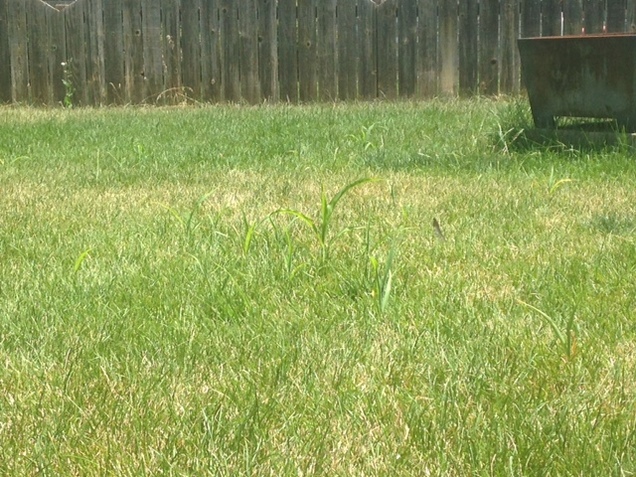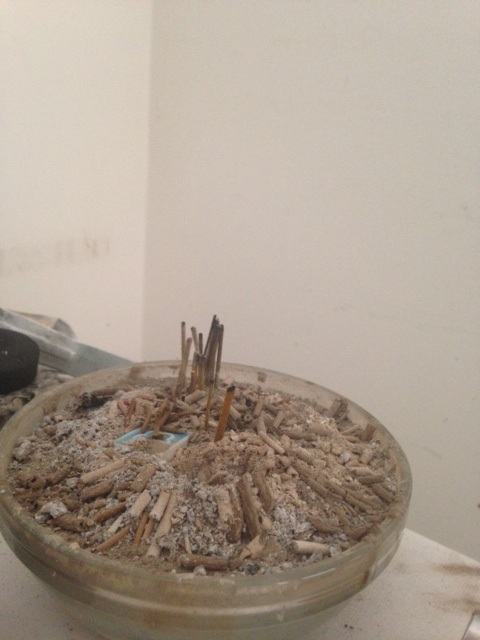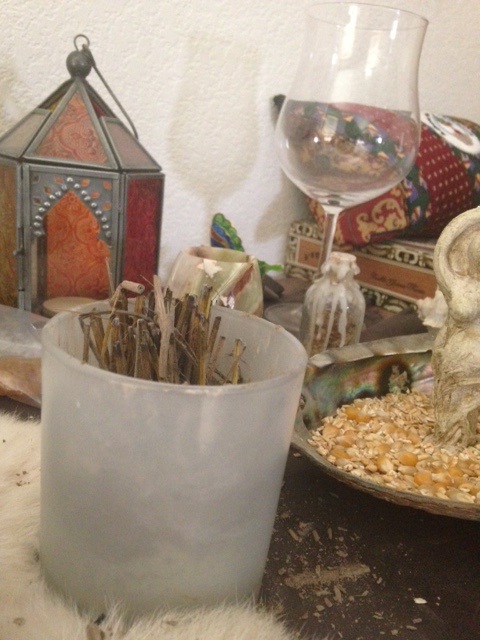by Rev. William E. Ashton, ADF
With an ominous weather forecast for the weekend, and a Subaru Forester packed to the gills with all necessary gear for a seventy-two hour Fire vigil, our Protogrove’s chief magical officer/interim bard and I set off for Beltania Festival (www.beltania.org), one of Colorado’s pagan festivals, hosted by Rev. Joy Burton and her team at Living Earth. Beltania started as Living Earth's seasonal rites, but soon transformed to a pagan-spirited music festival. While there are many presenters of rites and workshops, one of the main focuses of the festival is maintaining the 3-day concert vibe.
I first attended Beltania Festival in 2013, where Teo Bishop and I were asked to present a small panel on pagan theology, and another workshop presented by me on Druidry: Ancient and Modern. Let me qualify by saying that I’ve never been to a pagan festival prior to Beltania 2013, and have only been to a small handful since… I felt like a babe in the woods.
Having had a chance for three days to walk around the festival site, talking with many of the folk, and allowing myself some time to process my arising feelings of a certain something being missing, I concluded that there was no place to pray… or better yet, to make offerings as a folk.
You see, not being a festival veteran, and hearing much conversation about the rites and workshops attended, there was no place to support the awakenings, confusion, challenges, and emotions that arise from those experiences. Most workshop presenters aren’t prepared, or trained, to hold that kind of space with someone, especially right after they finish presenting. The feelings that were arising in me is how I could be a part of the change I wished to see (thanks, Gandhi). At the time, I was getting close to wrapping up CTP1, and had plans to enter into service for my community as a shiny new ADF cleric… not just the ADF folk in my budding Protogrove, but for the folk of this area, the area in which I ‘druid’, the Northern Colorado Front Range pagan folk-area.
We attend festivals for myriad reasons, not the least of which is to surround ourselves with people of like, or at least similar, mind. However, I found that there was no location on the grounds for the religiously-obsessive… like me. I wanted a place to pray and make offerings. I wanted a place to talk to clerics and trained religious professionals about challenges I was having in my process. I wanted a place to step aside from the clothing-optional, fertility-ridden insanity of the festival and enjoy a few moments of sitting with a sacred Fire, celebrating in a few moments of contemplation. At the same time I was finding myself wanting this experience, I also saw myself wanting to provide this experience to others.
I wanted a roadside temple.
Taking the opportunity to offer something that I felt was missing in my local community, I contacted Rev. Burton, and asked if I could hold a Fire vigil during the 2014 festival. Sharing the vision of it being a sanctuary for those in need, and being staffed by a newly ordained ADF Druid, and other leadership members of Mountain Ancestors Protogrove, as well as some dear Heathen friends, I awaited her response.
It came just before the festival.
HearthFire Sanctuary was born.
Finally getting the go-ahead and blessing of autonomy needed, I rushed around, pooling my resources, contacting friends and allies who identified as hard polytheists, as well as other ADF’ers in the area. Before you knew it, we had a team of five people who were willing to stay awake and fast for seventy-two hours, feeding a sacred Fire, and willing to sacrifice time, resources, and energy in service. (Hail and blessings to Gage, Casey, Sin, and Aoidhean - without y’all, I’d have been out there alone. Thank you)
Everything fell into place, and while there could have been improvements, we had to approach this first run as a grand experiment, and test of our collective pious will. I’m of the opinion that we passed with flying colors.
This place of respite received nearly ⅓ of festival goers, offering a caring ear, omens, Waters of Life, counsel, warm smiles in the cold, and a warm fire at any time, day or night.
HearthFire and it’s volunteers received high praise and blessings from all who came to our Fire, and was invited back for the following year’s Beltania to serve the folk.
It seems this was something our local community was needing.
Writing this piece, I find myself reflecting back on my experience of that first HearthFire Sanctuary… and aside from weather, wouldn’t have changed a thing. Sure, we were all exhausted, hungry, and cold, but even through that, we found the Fire replenishing for our spirits, the near-constant flow of offerings satiating, and the company of a diverse team dedicated to service, warming.
This year’s festival was at a camping conference center owned by the United Church of Christ, and they graciously offered the walled-in courtyard of a beautiful chapel to host HearthFire Sanctuary. Before beginning our set-up, we went into the chapel, and made spoken offerings to the Kindreds of that place, thanking them for welcoming us, and for giving us the opportunity to practice being good guests. Shortly thereafter, in the shadow of a huge Southwestern style memorial chapel, we kindled our Fire and opened the Gates (Thursday, May 14 at 1pm).
Perhaps it’s the timing of things when one is in liminal space, or perhaps it’s simple serendipity, but once the Fire was burning, people began to come. Slowly at first… gently… like they were experiencing this kind of opportunity for the first time. Their coins fell into the well, the Seer’s words came naturally, and the blessings were imbibed by each of our guests in our customary way. Over, and over. So similar to the first HearthFire Sanctuary in structure, but being in a new space, and having new folk come to offer at our Fire was what made this year unique.
An ecumenical group of young pagan men came to our Fire during their community rites-of-passage to make offerings and receive blessings. Those mourning the recent passing of loved ones came. Folks from one end of the pagan spectrum to another came… Heathens, Wiccans, Eclectics, Recon-folk, those claiming no name, nor title, nor boundaries… the folk came in all their diversity and beauty. We were blessed and honored to simply receive them, and send them back to the festival revitalized.
What’s really amazing is what arose for each of us: the clarity that comes with service, the moment one realizes why we call it religious ‘practice’. We take the time to have our daily observances and home-shrine customs so that when we’re standing face-to-face with someone who’s sharing their hurt, their joy, their confusion, their losses, their elation, and their grief… it is no longer time for practice. It is time to be present in a space where none of it is about you. It’s only about them.
To the Druid, it’s never about us… it’s always about the folk and the Kindred Three.
Period. That’s it.
It is vigilant service to others that awakens the Druid’s connection to Virtue.
It’s not that we can’t find deep moments of practice in our quotidian, daily shrine-tasks… it’s that in these moments of vigil for the sake of the folk, there is nothing else BUT that Virtue.
In those moments, we become emissaries of blessing, representatives of the Kindreds… we know we’re not professional therapists, but we don’t need to be. We simply need to be present with another person in that moment without concern for anyone but them.
Practicing being present sounds easy enough, but if we’re attached to something that another shared with us in such a way that we’re just waiting to dispense our own similar experience, we’re not present. If our minds are wandering after the 50th person comes to the Fire in a row, or when someone returns again and again seeking further details about earlier omens, we’re not present. If we’re not consciously choosing to simply be with that person in that moment, we’re not present.
When we’re being fully present with others, we’re not engaged in comparing our own experience to theirs. It’s difficult to be present with someone and not have ‘solutions to their problems’ arise… what they ‘should’ be doing, or saying, or being. ‘Should’ is born out of a place where it’s more important to be right (also read as ‘helpful’) than it is to simply be present with someone where they are.
It is our goal when in service at HearthFire that the accursed word “should” doesn’t enter into our consciousness, and if it does, we let it pass like a cloud in the sky, or a car on the road. You see, judgements make it hard to be present with those at our Fire.
I’m certain there is much of my own bias in my privileging of being present and mindful. This stems from my educational experience at Naropa University, a Buddhist-inspired institution. However, we as Druidic pagans can explore the relationship between being present/mindful and our own Hospitality-rooted practices.
When our minds are elsewhere, we cannot know what is the right offering… be it for one of the Kindreds, or a guest at our homes, or our Fire. It’s the religious equivalent of being handed an apple martini after sharing with someone that your preference is bourbon, neat. Were we mindful, closer relationships can be built, deeper connections can be made… and people feel heard.
What’s this all got to do with creating a semi-permanent, fully-staffed temple at pagan festivals? In short, it’s what some folk have been quietly waiting for. It is through being present with them that we step outside of ourselves, and when they see us doing that… true community is created, and our worth as ADF’ers shines. We are a unique lot. We have tremendous opportunity to practice religious ecumenism in the pagan community. We are the creators of community. We are Druids.
Druidic service is to not only embody the study and learning from our rigorous coursework, it’s to know which tool to use in which scenario… and to know when you’re not talking about inanimate things like nuts and bolts, but instead, talking about people. You see, the challenge of Druidic service is that we’re not working with THINGS, we’re working with PEOPLE. This is where all our academia and study takes a hit if we’ve nothing to offer the folk but data. In other words, there’s a huge difference between sitting with someone who is suicidal, bearing witness to their process, being their ally, holding sacred all they share, and telling someone why they’re feeling suicidal, and prescribe them a statistically-proven course of actions to not feel that way anymore. This whole process isn’t about our comfort, it’s about theirs.
If we look at ‘Druids’ as the religious leaders in a community, then it shifts our paradigm from the practitioners of druidic paganism to actual, modern Druids. In a sense, it’s our obligation to serve in this capacity. We know the expectations of academic excellence ADF has set, and we know the training others in the general pagan community receive (to a greater or lesser degree). Born out of this knowledge is what I call the “Challenge of Druidic Service”. By the very nature of Our Druidry, our collective toolboxes are stuffed full of tools that many of our pagan siblings do not have. It would be like having the perfect tools to complete a job, and not using them to their fullest to help those in need. We move throughout our respective communities as beings who are invested in something greater than ourselves, greater than our small groups of exclusive ADF’ers, greater than Our Druidry… gods be good, we move through our communities as examples of excellence, hearing their needs, and being invested in seeing those needs met.
That’s what setting up a “24/7” community temple looks like to me, and that’s what it’s gonna keep lookin’ like for a while… until the Kindreds or the folk show me another way. Gods be good, we can hold spaces like this for our non-ADF pagan siblings’ festivals. If anyone can, we can.
Live for the folk… remember, our way is about service. Community-level *ghosti, dig it?
May our gods bless us all, that we may do our good work, and hold space for all to attend our Good Fire.
Blessings, y’all.




 RSS Feed
RSS Feed
